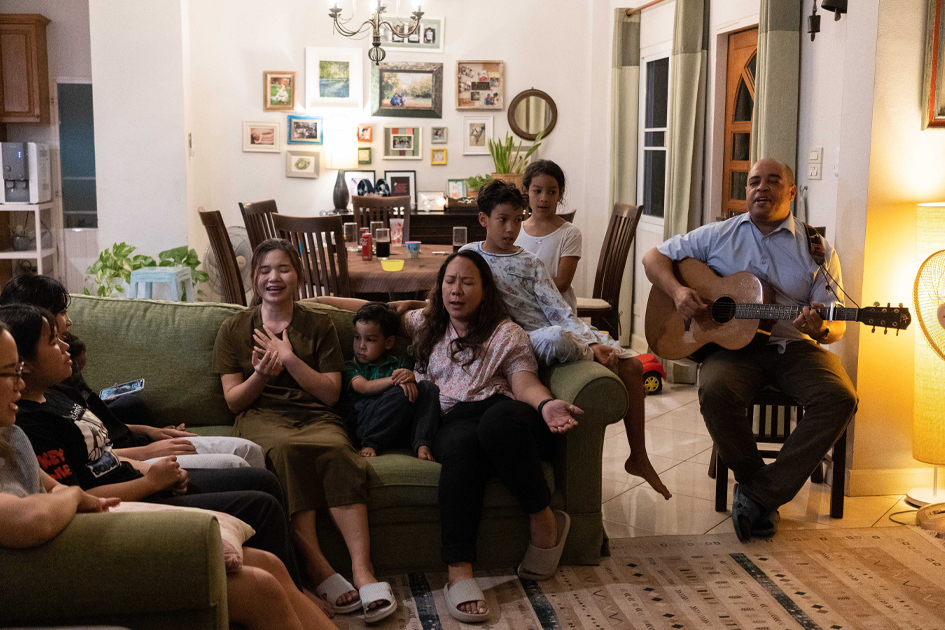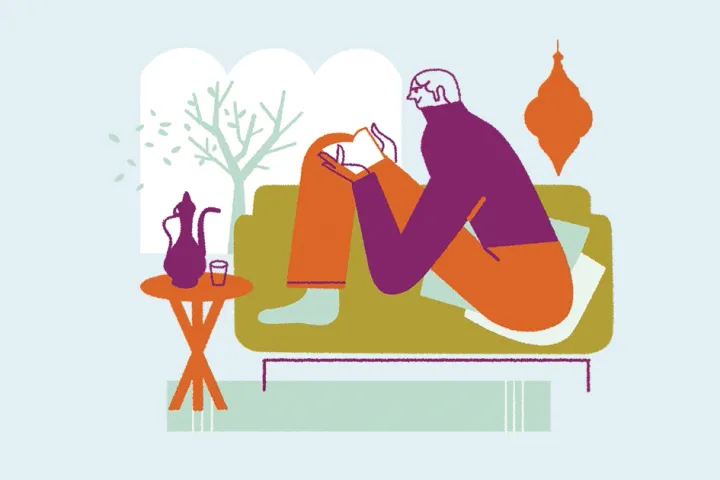Now in her mid-40s, Nice Bowers fondly remembers those early mornings in the Home of Blessing. Half asleep when the alarm clock rang, she would slowly peel herself from bed, the excited chatter in the surrounding rooms seeping through the morning haze. The sound of the other children in the hallway would spark in her brain, It’s time for the morning devotional—and soon she’d appear with her Bible in hand to join the procession of kids. More and more of them would enter the hall until a sizable crowd formed. Then everyone would move toward the large meeting space where Bower’s mom and dad were standing, ready to lead them in prayer and worship.

Photography by Jittrapon Kaicome
Bowers thinks back to how much she, as a child, relished questions about her family. She had become accustomed to the wide eyes and dropped jaws. “So, how many brothers and sisters do you have?” people would say, and she’d answer, “Actually, I have over a hundred sisters!”
At the Home of Blessing—the ministry founded by Bowers’s parents, Sayan and Siriporn Kusavadee, in 1990—girls rescued from sex trafficking find healing from trauma and an opportunity to begin again. The children, who come to the home as young as 5, attend a local public school during the weekdays, an option not afforded to many in their home villages. But outside of school, they also learn valuable home and life skills.

Siriporn gardens with girls at the Home of Blessing.
From cooking and cleaning to gardening and farming, the Kusavadees make sure the girls have a well-rounded education to better navigate daily life. Besides being empowered to mentor and disciple the elementary students, the older high school girls also teach and lead many of the routines around the Home. From the outside, the disciplined approach appears to be in place for practical reasons—the home must run efficiently with so many residents. But the rules and routines are doing something deeper: They provide a sense of stability, calm, and purposeful belonging. And while Sayan had the faith to make this ministry happen, it was Siriporn who saw the need and struggles of the girls in their ministry. The more active of the two, she has been involved in every aspect of the students' lives. “The hearts of my parents just want to share the love of Christ with [the girls] and want them to know that they are worth it,” Bowers says. “All of the girls that come to us have so much potential and so many gifts and dreams, and we want them to see that they are very precious in our and God’s eyes.”
****
Neither Sayan nor Siriporn ever imagined they would dedicate their lives to a ministry of this kind. It all started after studying at Bangkok Bible Seminary and working at a Bible college in Bangkok. Sayan had felt called by God to return north to their hometown of Chiang Kham. There they made ends meet by pastoring in the city while Siriporn started a kindergarten in the church basement. “We called my dad ‘Crazy Faith’ growing up,” Bowers says. She saw him trust in God again and again, even when the circumstances didn’t make sense. “He would just say, ‘This is what we’re going to do.’ And the Lord just opened doors.”

The Home of Blessing is located in Chiange Kham in Northern Thailand.
In serving their community, the Kusavadees gradually became aware of the hardships girls faced in their town and the surrounding mountains. Many villagers endure harsh living conditions there, largely due to ethnic discrimination—extreme poverty and lack of access to education and healthcare. Girls are often forced to work in prostitution out of desperation or are sold into marriage to support their families.
Initially, the Kusavadees took in and cared for four girls, along with their own three children. Thirty years later, the Home of Blessing serves around 100 girls at a time, their ages ranging from 5 to 18. While not all the girls have been in situations as critical as human trafficking, every one is vulnerable in her own way. Some have fragmented families, with parents either in prison or suffering from drug addictions or alcoholism. Others are being raised by their grandparents, who can barely make ends meet. Every child in the home needs a safe place to flourish.
“Growing up, I feel like I had the privilege to be a big sister to all the girls. And when I look back, it’s really amazing to see all that I learned from my parents,” Bowers says. That includes “the faith of trusting and obeying whatever God is calling you to do and [watching Him] make it happen.”

Nice stands with her parents Sayan and Siriporn.
****
A young woman named Um was a student at the Home of Blessing for 10 years and the last of three sisters to join the program. They’d been born into poverty and volatile home life, with parents who were unable to provide for their children’s physical and educational needs.
At the Home, Um has felt both moved and perplexed by the love she’s received so freely. Why would strangers care for her like this? She watched other students and grew in her understanding of Christianity, though she was hesitant to commit to the faith.
She had only one prayer: “If You’re real, would You reveal yourself and show me a miracle—that my parents would stop fighting?” She knew there was no other hope for her family. After offering this prayer for more than three years, she saw her parents reconcile and the abuse at home end. Um knew it was the work of God, and she gave her life to Christ.

Students arrive back at their village to visit their family.
Throughout the year students can visit their families during extended school breaks. As the girls return to their home villages, taking new skills and knowledge with them, they also bring the love of Christ—and with that love, the hope of changing the surrounding culture. “They have been praying for their people,” Bowers says. “When they share the gospel and their experience, the parents see the difference, and many give their lives to Jesus.”
Through the years, as young women like Um have brought the Home of Blessing to the homes and villages of their families, real and lasting change has started to take place. Families have been transformed, churches have been planted, and destructive cycles have ended. But not every story is a happy one, and initial positive results can be short-lived. Many of the same community issues still exist, and even seemingly trivial circumstances can be enough to pull the young ladies back into the grips of past dangers. School fees and difficulty finding jobs make it difficult to hold on to dreams and passions gained while living at the Home of Blessing.

A student spends time with her family in her village.
****
Early one Friday evening, Nice is busy in the kitchen, preparing dinner with graduates of the home. Music plays faintly in the background, so they all move with an extra skip in their step. Others play board games at the dining table.
After the meal, everyone sits in the living room. Andrew, Nice’s husband, leads worship, strumming his guitar. Together they share the Word and how to apply its wisdom to their daily lives. For most of the graduates, their work or school schedule is grueling—so any chance to fellowship together is a respite.
A few hours south of the Home of Blessing, the Bowers family—Nice, Andrew, and their four children —foster a haven of their own. Because Chiang Mai is a larger city not far from the ministry, it’s a location many graduates move to in search of work or education opportunities. So today Nice and her husband are finding an unexpected calling in their immediate surroundings—serving at-risk students the way her parents did 30 years ago.

The Bowers worship with Um and other graduates in their home.
“We don't want them to feel like they leave the Home of Blessing and now they're on their own,” Bowers says. “This is your family; you are not strangers; you are always welcome here. We want to build a community where we can fellowship, pray, worship, and connect. We want them to know that we can do this together.”
Much of Nice and Andrew’s family life is now spent mentoring and advocating for the graduates in Chiang Mai. Whether in their home or spending time with those young ladies around the city, they foster a community of hope and encouragement.
Um recalls her prayers the last couple of years before she graduated from the Home of Blessing. “Don’t let me forget You, God,” she prayed. “Don’t let me forget this feeling I have right now.” In her journey into adulthood, she knows that Nice and Andrew have been an answer to that prayer.

Nice and Um explore the markets of Chiang Mai together.
Like the Home of Blessing, the path has been surprising yet clearly a godsend. It's something Bowers and her family never would have anticipated. But watching the bold faith of Nice’s parents, they know God has been leading them here all along.
“Growing up with the Home of Blessing, I feel like the Lord has prepared me for something that I couldn’t expect,” Bowers says. “When I was young, I didn’t get it, but when I look back, I see Dad and Mom persevering, the Lord opening doors and providing even though I didn’t understand. How we grew up—including people and fellowship—means so much to me.
That’s what I want my family to be like.”





